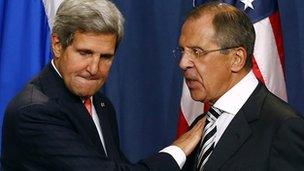Devil in the detail of draft UN resolution
- Published
- comments

The latest draft conforms closely to the US-Russian agreement reached in Geneva
The shape of the United Nations Security Council resolution on the destruction of Syria's chemical weapons is now clear, after a draft was agreed on Thursday night. So now we know its good points, its bad, and what was conceded to achieve compromise.
It is the Council's most important job to deal with threats to international peace and to put it simply, the idea of the Assad regime imploding and its chemical arsenal going adrift scared the wits out of Russia or China as much as it did anyone else.
When I asked one senior Western special forces officer a few months back how they might deal with jihadist groups overrunning nerve gas stores he shook his head and said, "That's the nightmare scenario."
So the new resolution, assuming it is passed soon, puts an internationally agreed plan together to deal with a serious threat and that is an achievement. In a world in which weapons of mass destruction are proliferating at an alarming rate, it also provides a template for how similar crises might be dealt with in the future.
That the draft does nothing to stop the Syrian conventional weapons slaughter may sadden people, but should not come as any surprise, given how divided the Security Council powers have shown themselves to be on that issue.
Similarly Thursday's compromise formula shows the Russian determination to prevent this resolution becoming the legal enabler for intervention in that civil war.
France's original draft had lambasted the "disproportionate, indiscriminate and systematic use of weapons by the Syrian authorities against its own people", urged an investigation of those responsible and the referral of war crimes carried out since the start of the conflict to the International Criminal Court.
The agreed draft has none of this, conforming instead closely to the US/Russian agreement reached in Geneva on 14 September.
While the French had wanted to give the freedom, "to adopt further necessary measures under Chapter VII" in the event of Syrian breaches of the agreement, the agreed draft now mentions, "measures under Chapter VII". What's in a word, in this case the missing word "necessary"?
Legal authorities would doubtless argue the point - and be paid hourly for doing so - but the original drafting was closer the "all necessary measures" phrasing that experts agree encompasses military force.
Now the different protagonists will spin things their own way - the UK ambassador to the UN, Sir Mark Lyall Grant, for example applauds the agreed text as, "binding and enforceable". Sergei Lavrov, Russia's foreign minister, meanwhile insists that it does not empower military action and that a further Security Council resolution would be required to do so.
If you feel a sense of deja vu about this Chapter VII wording debate it probably goes back to Resolution 1441 in November 2002 which contained reference to, "serious consequences" if Iraq remained in breach of its obligations. The US considered this gave sufficient legal basis for military action, others, including the UK, did not, hence UK Prime Minister Tony Blair's unsuccessful search for a "second resolution".
A similar legal dispute could now be possible if Syria breaches its obligations.
The US, which has never in any case accepted that UN Security Council resolutions are required for it to use force if it believes its national security is threatened, may feel free to mount strikes. But for the UK and France, particularly following the vote in the British parliament, a UN resolution that does not clearly authorise force is likely to be one more impediment to action in Syria.
Of course, this agreement could not have been reached without certain ambiguities on this point about the "or else". Those who have negotiated the wording, first in Geneva and then in New York will just have to hope that its strengths outweigh its weaknesses and that it dissuades rather than encourages a regime desperate for survival to test international resolve.